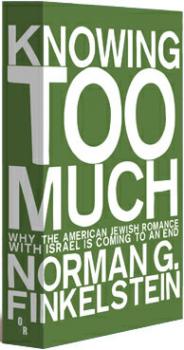 In its 2010 report ‘Building a Political Firewall Against Israel’s Delegitimization’, the Tel Aviv-based Reut Institute speculated that ‘the Jewish world is growing more distant from Israel’ because ‘a growing number of Jews do not have enough historical knowledge’.
In its 2010 report ‘Building a Political Firewall Against Israel’s Delegitimization’, the Tel Aviv-based Reut Institute speculated that ‘the Jewish world is growing more distant from Israel’ because ‘a growing number of Jews do not have enough historical knowledge’.
In his latest book, Norman Finkelstein argues persuasively that – at least in the case of the US – the reverse is true: namely, that a growing section of the disproportionately liberal US Jewish public (only African-Americans have voted Democratic and self-identified as liberals in greater numbers) now knows too much about the realities of the Israeli-Palestine conflict to continue to lend Israel its blind support.
‘A young, liberal and idealistic Jew does not want to have to defend flooding south Lebanon with four million cluster submunitions, or firing white phosphorus shells reaching a temperature of 1,500 degrees Fahrenheit on hospitals in Gaza, anymore than he or she wants to defend the legality of Israeli settlements against the considered opinion of every member of the International Court of Justice,’ he notes. ‘[I]t’s just not a Jewish thing.’
Moreover, this has practical consequences for activists: ‘If the liberal conscience of American Jews is pricked and, finally, they do the right thing, the long, dark night might yet soon end.’
Following a survey of the evidence concerning the political beliefs of US Jews and their shifting attitudes towards Israel, Finkelstein recaps his thesis – first expounded in his The Holocaust Industry(2000) – that the US Jewish love affair with Israel only really began in 1967, when the latter became a US ‘strategic asset’ as a result of the ‘Six Day’ war.
He then proceeds to dismantle the notion that it is ‘the Israel lobby’, rather than a hard-headed calculation of ‘national interests’ by US planners, that dictates US policy in the region. Not least because the idea of the all-powerful Lobby is quite popular in activist circles, this is probably one of the book’s most useful chapters.
Finkelstein’s analysis here is nuanced: he concedes that the Lobby’s ‘ruthless tactics in support of the Israeli occupation have subverted American policy on the secondary issue of the Israel-Palestine conflict’, but rejects the far-fetched notion that it was the driving force behind the 2003 decision to invade Iraq. ‘Many unflattering things might fairly be said of Cheney and Rumsfeld,’ he notes ‘but gullible and naive are not among them.’
The book’s core, however, consists in a brilliant analysis of six texts illustrating, among other things, the yawning chasm between the popular literature on the conflict (eg Michael Oren’s best-selling Six Days of War: June 1967 and the making of the Modern Middle East) and scholarship; the continued publication of highly-praised works of pseudo-scholarship (eg Isabella Ginor and Gideon Remez’s Foxbats over Dimona: The Soviets’ nuclear gamble in the Six-Day War), and the power of the Lobby to still occasionally skew the conclusions of reports by major human rights organisations (eg Human Rights Watch’s ‘Why They Died: Civilian casualties in Lebanon during the 2006 war’).
Standouts are his demolition of Clinton envoy Dennis Ross’ account of the ‘peace process’, a scathing reading of Jeffrey Goldberg’s memoir Prisoners, and his hilarious skewering of the ‘Foxbats’ hoax.
The latter, a ‘revisionist’ account of the ‘Six Day’ war, alleges that the Soviet Union, panicked that Israel was about to start producing nuclear weapons, conspired with Arab leaders to create a pretext to launch a pre-emptive strike on Israel’s nuclear reactor at Dimona, but that their plans came to naught due to the unanticipated effectiveness of Israel’s first strike.
Despite praise for the book from academics at LSE and Princeton, Finkelstein convincingly demonstrates that the whole theory is nothing but a house of cards.
Thus, ‘Exhibit A’ for the conspiracy is the authors’ contention that Soviet pilots flew MIG-25s (Foxbats) over Dimona just days before the war began – a claim ‘supported’ by a 1993 interview with Soviet flying ace Aleksandr Vybornov that appeared in a Russian provincial newspaper. There, the authors claim, Vybornov stated that he had ‘witnessed the Israeli attack on an Egyptian airfield’, proving that he was in Egypt during the 1967 war.
Finkelstein tracked down both the original article and Vybornov himself, who the Foxbat authors themselves had failed to contact, despite the fact that he was alive and well and living in Moscow. It turns out that: (a) Vybornov makes no such claim in the cited interview; and (b) he explicitly denies being sent to Egypt prior to the 1967 war, or that he or any other Soviet pilot flew a Foxbat over Dimona. And so it goes for the rest of the ‘evidence’.
Elsewhere, Finkelstein notes the ‘peculiar juxtaposition’ of Jeffrey Goldberg – a well-known US journalist who emigrated to Israel in the 1980s and served as a military policeman at the Israeli prison Ketziot during the first Palestinian intifada [uprising] – ‘singing the praises of gun Zionism on one page, while singing the praises of Mahatma Gandhi and Martin Luther King Jr to Palestinians on another’, all while contributing to the ‘ignoring [of] Palestinian civil disobedience and airbrushing [of] Israeli brutality that has thus far doomed this tactic to failure.’
Citing Goldberg’s claim that American peace activist Rachel Corrie ‘came too close to [an Israeli bulldozer] and ... was plowed under’, Finkelstein caustically observes, ‘Just as the Twin Towers came too close to the hijacked planes and got plowed under.’
Anyone with prior exposure to Finkelstein’s forensic scholarship will not need my encouragement to dash out and purchase this book, though newcomers to either Finkelstein or the issues involved, might be better off starting with Beyond Chutzpah (see PN 2506), with its laser-like focus on Israel’s human rights record.


